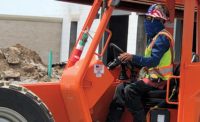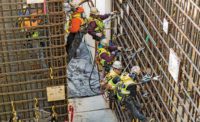Following President Donald Trump's decision to close U.S. borders to citizens of 26 European countries in response to the coronavirus, organizers of the Las Vegas construction trade show CONEXPO-CON/AGG & IFPE will end it a day early, on March 13, marking one of many industry precautions in response.
[For ENR’s latest coverage of the impacts of the COVID-19 pandemic, click here]
“It changes by the minute,” says Larry Klein, midwest regional leader of the construction services group at CRB, which temporarily closed its Philadelphia office for a thorough cleaning out of "an abundance of caution" after two employees were at a jobsite where two non-employees had tested positive for the virus. The office was expected to reopen March 13.
Additionally, the company is holding more video conferences and is making sure workers take laptops home for the day in the event an office is closed.
“I think open communication is important,” Klein says. “This is instilling fear in people.”
An Atlanta-based manager for JE Dunn Construction told ENR that the contractor has not been impacted by any outbreaks and all of its jobs are still active. “But I can almost project that with the exponential spread of something like this that we will have to address that,” says Dan Kaufman, its regional vice president
Equipment Impacts Ease
But some fears may not be realized.
Initial concerns about the virus, also referred to as COVID-19, were voiced by heavy equipment managers focused on how a slowdown in China would disrupt manufacturers’ supply lines. But those issues seem to have been mostly worked out, with many Chinese factories coming back online this month.
The larger issues may not be disruptions in shipping from China, but delays or halts in construction-related activity due to the virus.
Chris Sleight, managing director for UK-based equipment market analyst Off-Highway Research, says if a virus-related slowdown is coming, it’s arriving just as the global equipment market is peaking.
“2019 was another good year. In our measure of the market, which is specific machine types, about 1.1 million machines sold worldwide, which was down just 1% or 2 % from 2018, so basically the second highest volume on record.”
Off-Highway Research focuses primarily on sales of earthmoving equipment and cranes, which it uses to track economic activity in key markets around the world.
Sleight says that the good times for equipment sales have lasted longer than he and some other analysts had forecast, and the impact from COVID-19 may only be one of many factors leading to a cool-off period.
“Obviously the market has been in a good place, globally and in general, and most individual markets have kind of reached a peak. So we felt that even without Coronavirus that the top of the cycle had been reached,” he told ENR at the CONEXPO-CON/AGG show on Mar. 11.
“It’s very clear now North America, Europe and China did peak last year. We were always going to see a downturn this year, and it just kind of depends on what Coronavirus does to that,” says Sleight. “I think pre-Coronavirus we would have said maybe the cyclical downturn [in global equipment sales] would be 10%. Right now I don’t know what it will be, but it will probably be more than 10%.”
In response to the coronavirus pandemic, Kaufman says JE Dunn has developed “tangible action plans” for four different situations: If a job site is closed; if the company’s own offices are closed due to external circumstances; if schools and daycare centers close (thereby impacting employees); and if an employee or an employee’s family member becomes sick.
“And every one of these scenarios has a difference to it,” Kaufman said.
The company’s response to various projects will also differ from site to site.
The company’s multiple projects at higher-education sites in Georgia—such as at Georgia Tech and Georgia Southern University—also are still active, despite cancellation of on-campus classes in some cases.
“That's where today it's going to be different than tomorrow,” Kaufman said, anticipating the highly fluid situation to remain so.
Health-care projects—which constitute about 25% of JE Dunn’s work—can also vary in terms of requirements. Building a new hospital on a greenfield site can be more similar to other project types, but much of the firm’s health-care jobs involve renovations to existing hospitals.
“A healthcare company is going to look at this more stringently, so we're preparing for it,” he says.
Future project schedules also could have impacts. “We have a number of jobs that we planned on starting within the next month, and there's now nervousness” about start dates, he says.
Depending on what happens with the stock market and bank lending, Kaufman estimates that some jobs could be delayed by “at least a month,” adding that “delaying a job is a big revenue impact for the industry."
He emphasizes: “If this thing lasts three months, that's absolutely a huge impact when it takes almost a quarter of your earnings.”








Post a comment to this article
Report Abusive Comment